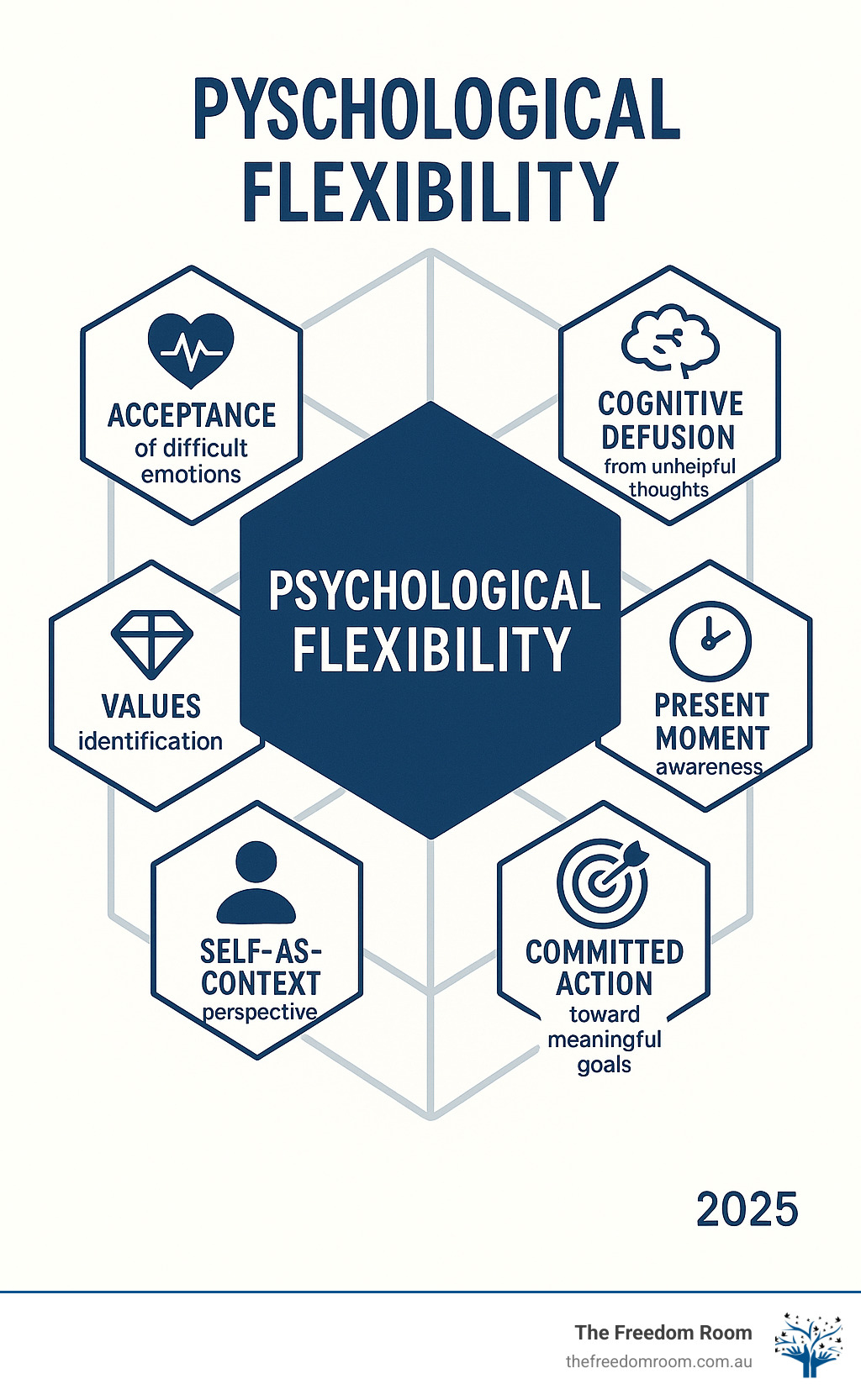Understanding ACT Behavior: The Path to Psychological Freedom
ACT behavior meaning refers to Acceptance and Commitment Therapy, a psychological approach focused on developing psychological flexibility. It uses six core processes to help individuals accept difficult inner experiences while committing to actions aligned with their values.
Quick Answer – ACT Behavior Meaning:
- Acceptance: Allowing difficult emotions without fighting them
- Cognitive Defusion: Observing thoughts without being controlled by them
- Being Present: Staying mindfully connected to the current moment
- Self-as-Context: Recognising yourself as the observer of your experiences
- Values: Identifying what truly matters to you in life
- Committed Action: Taking steps aligned with your values, even when it’s difficult
If you struggle with addiction, anxiety, or feeling stuck, understanding ACT behaviour could be transformative. This approach does not promise to eliminate pain; instead, it teaches you to develop a healthier relationship with it.
ACT recognises that psychological suffering often stems from our attempts to avoid or control unwanted thoughts and feelings. As its founder, psychologist Steven C. Hayes, finded through his own experience with panic attacks, the harder we fight our inner experiences, the more stuck we become.
The practical wisdom of ACT is that instead of spending energy trying to feel better, we learn to live better. This shift from emotional control to psychological flexibility opens up possibilities for a richer, more meaningful life, even with difficult emotions.

Simple act behavior meaning glossary:
What is Acceptance and Commitment Therapy (ACT)?
Acceptance and Commitment Therapy (ACT), pronounced as the word “act,” is a therapeutic approach to mental health and wellbeing. Developed by psychologist Steven C. Hayes, this act behavior meaning centres on building psychological flexibility rather than eliminating difficult thoughts and feelings.
ACT is part of the “third-wave” of behavioural therapies. It builds upon traditional behaviour therapy and cognitive behavioural therapy (CBT) but takes a different approach to human suffering.
The core insight of ACT is that much of our psychological pain comes from our attempts to avoid or control unwanted experiences. This pattern, known as “experiential avoidance,” may offer temporary relief but often creates more suffering long-term.
Instead of fighting unwanted thoughts or feelings, ACT teaches us to develop a new relationship with them. The goal is not to feel better immediately, but to live better by moving towards what matters most, even when life is challenging. This journey towards greater psychological flexibility is the heart of what act behavior meaning represents.

The Core Philosophy of ACT
At its foundation, ACT accepts that human struggle is normal. Difficult emotions and painful experiences are not signs that something is wrong with us; they are part of being human.
Our culture often suggests we should feel good most of the time, a belief ACT calls the “normalisation fallacy.” This mindset can trap us in exhausting battles against our own inner world.
ACT takes a different path, asking, “What works in building a meaningful life?” This shift towards workability—focusing on what moves us forward rather than what offers temporary relief—is a liberating process.
The problem of control is central to this idea. Trying to control our emotions often leaves us more stuck. ACT suggests that embracing difficult emotions frees up energy for living a life aligned with our values. This does not mean passivity, but rather channelling our efforts towards valued actions, especially when they feel uncomfortable.
The Main Goal: Increasing Psychological Flexibility
The primary aim of ACT is to develop psychological flexibility: our ability to stay present with our experiences while choosing actions that serve our values. It combines emotional openness with behavioural adaptability.
Psychological flexibility involves staying connected to the present, observing our thoughts without being overwhelmed, and adapting our behaviour to serve what matters. It is about responding with agility rather than rigid, avoidant patterns.
When we develop this flexibility, we can carry difficult emotions while still taking meaningful action. We learn that aligning with personal values requires willingness, not comfort or confidence. This capacity transforms how we steer everything from daily stress to major life challenges. For a comprehensive exploration, visit our guide on Acceptance and Commitment Therapy (ACT) Explained.
The Six Core Principles: Understanding the act behavior meaning
ACT is built upon six interconnected core processes, often shown in the Hexaflex model, which work together to foster psychological flexibility. These principles form the foundation for understanding the practical application of ACT behavior meaning.

1. Acceptance: Making Room for Discomfort
Acceptance in ACT is not resignation but an active process of making room for uncomfortable thoughts, feelings, and sensations. Instead of fighting or suppressing these experiences, we learn to allow them to come and go without judgement. This shift from avoidance to acceptance is crucial for healing, as explored in our resources on ACT and Mindfulness for Trauma.
2. Cognitive Defusion: Unhooking from Thoughts
Cognitive defusion is about changing our relationship with our thoughts. We often get “fused” with them, treating them as literal truths. For example, we might believe the thought “I’m a failure” and let it dictate our actions. Defusion techniques help us “unhook” by seeing thoughts as just words or mental events, not facts. This creates distance, allowing us to choose our response. Learn more in our guide on Mindfulness and ACT.
3. Being Present: Contact with the Now
Being present means cultivating mindful awareness of the here and now. It involves paying attention to our internal and external experiences with openness and curiosity, rather than being lost in the past or future. This grounding in the present moment allows us to experience life more fully and respond with greater flexibility.
4. Self-as-Context: The Observing Self
Self-as-context, or the “observing self,” is the part of you that notices your thoughts, feelings, and experiences without being defined by them. It is like the sky that holds the ever-changing weather. This perspective provides a stable viewpoint from which to observe our inner world without getting caught up in it.
5. Values: Your Inner Compass
Values in ACT are chosen qualities of action that give our lives direction and meaning. They are not goals to be achieved but an inner compass guiding our behaviour, such as being a loving parent or a courageous person. Clarifying our values provides powerful motivation for committed action. Our page on ACT Values offers more resources.
6. Committed Action: Taking Valued Steps
Committed action involves taking concrete steps guided by our values. It means building patterns of behaviour that align with the person we want to be, even in the presence of discomfort. For example, if we value health, we might exercise even when unmotivated. This process often uses goal setting and skills training, as detailed in our ACT Interventions guide.
How ACT Differs from Other Therapies like CBT
Understanding act behavior meaning becomes clearer when compared to other therapeutic approaches like Cognitive Behavioural Therapy (CBT). While from the same family, ACT and CBT have different philosophies on relating to our thoughts and emotions.
These distinctions have real implications for the therapeutic journey. If you have tried traditional therapy, understanding these differences may explain why ACT could offer a new path.
The Core Distinction: Changing vs. Accepting Thoughts
The most significant difference is how each approach handles distressing thoughts.
Traditional CBT focuses on identifying, challenging, and changing irrational or unhelpful thoughts. The goal is to restructure them into more balanced and realistic beliefs. For example, in addiction treatment, CBT helps challenge thoughts that lead to cravings, a process detailed in our guide on CBT for Addiction.
ACT takes a different path. Instead of changing thoughts, it focuses on changing your relationship with them. The goal is to observe thoughts without letting them dictate your actions. With ACT, you might notice a thought like, “I really need a drink,” and learn to choose a response based on your values, not the thought’s demand.
The Role of Symptoms and Emotions
The two therapies also view the role of difficult emotions differently.
CBT typically aims for symptom reduction as a primary goal. Success is often measured by how much less anxious or depressed you feel. Our work with CBT for Alcoholism demonstrates this symptom-focused approach.
ACT does not target symptom reduction as its main aim. Instead, it focuses on building a rich, meaningful life, even if difficult emotions persist. It recognises painful feelings as a natural part of life, not problems to be solved. Symptom reduction often occurs as a natural byproduct of living according to your values.
Research, including a randomised controlled trial in Behavior Research and Therapy, shows both can be effective, achieving results through different pathways. This makes ACT appealing for those who find that fighting their thoughts has not led to lasting change.
The Evidence and Applications of ACT
The act behavior meaning is validated by decades of rigorous scientific research, making ACT one of the most well-researched and versatile therapeutic approaches available. It has proven helpful across an extraordinary range of human struggles.

What Conditions Can ACT Help With?
ACT’s effectiveness spans numerous mental and physical health challenges because it addresses the underlying processes of suffering.
- Anxiety disorders: ACT helps you accept anxious thoughts and feelings while still moving towards what matters.
- Depression: It helps individuals reconnect with values and take meaningful action, even when depressive thoughts are present.
- Substance use and addiction: ACT teaches you to experience urges without automatically acting on them, a crucial skill for recovery.
- Chronic pain: It helps individuals build rich lives despite ongoing discomfort, shifting focus from pain reduction to life improvement.
- Post-Traumatic Stress Disorder (PTSD): Its emphasis on acceptance and mindfulness provides gentle pathways for survivors to reconnect with their experiences.
- Obsessive-Compulsive Disorder (OCD): ACT helps individuals experience obsessive thoughts without engaging in compulsions.
- Workplace stress and burnout: It helps employees build resilience and stay connected to professional values.
The Scientific Support for the act behavior meaning
The research supporting ACT is extensive. As of 2025, over 1,300 randomised controlled trials and more than 550 meta-analyses and systematic reviews have investigated its effectiveness.
Multiple meta-analyses confirm ACT’s efficacy. A comprehensive meta-analysis found significant improvements for anxiety, depression, substance use, and chronic pain. Research also shows ACT outcomes are comparable to, and sometimes exceed, those of CBT.
A 2020 review of 20 meta-analyses involving over 12,000 participants concluded that ACT is effective across a wide range of conditions. This global recognition is further evidenced by the World Health Organisation’s release of “Self-Help Plus (SH+),” an ACT-based self-help programme. These findings consistently show ACT improves overall quality of life, not just symptoms, aligning with its core philosophy.
Frequently Asked Questions about ACT
Understanding ACT behavior meaning in practice often raises practical questions about the therapeutic approach. Here are some common queries.
What does a typical ACT session look like?
An ACT session is highly experiential and differs from traditional talk therapy. Instead of only discussing problems, you will actively engage with the core principles through various methods:
- Experiential exercises: Simple mindfulness practices or creative activities help you directly experience concepts like acceptance or defusion.
- Metaphors: Stories and analogies, like thoughts being leaves on a stream, make abstract concepts tangible and memorable.
- Mindfulness practice: Guided meditations and breathing exercises help develop present-moment awareness without judgement.
- Value clarification: Writing exercises and reflective discussions help you identify what truly matters to you.
- Committed action planning: You will work with your therapist to identify concrete, value-driven steps to take between sessions.
Is ACT difficult to learn?
ACT can feel challenging at first because it asks for a new perspective. Learning to accept difficult thoughts and feelings, rather than control them, can be a significant but rewarding shift.
While concepts like self-as-context can take time to grasp, ACT is a skill-based therapy. Like any new skill, it improves with guided practice and repetition. The emphasis is on progress over perfection, as small shifts can create meaningful improvements over time.
How does ACT view the role of language and thoughts?
ACT has a unique view of language, grounded in Relational Frame Theory (RFT). This theory explains how our ability to use language can create psychological traps. We can become “fused” with our thoughts, treating negative self-talk as absolute truth.
Cognitive fusion is when we become so entangled with our thoughts that they control our behaviour. ACT teaches us to use language flexibly through defusion techniques. We learn to step back and observe thoughts with curiosity, choosing which ones deserve our attention and action. This is central to the ACT behavior meaning—developing a more flexible relationship with the thoughts we have.
Ready for Change? Let’s Build a Stronger, Alcohol-Free Future Together
Understanding ACT behavior meaning opens a doorway to profound personal change. By grasping how acceptance, commitment, and psychological flexibility work together, we gain powerful tools for navigating life’s challenges. This approach offers a way to live authentically by embracing both the joys and difficulties of being human.
The core message of ACT resonates with anyone who has felt stuck. Rather than fighting difficult emotions, we learn to make room for our full human experience, creating space for genuine healing.
Building a Life Worth Living
At The Freedom Room, we understand that recovery from alcohol addiction requires more than just stopping drinking—it demands building a meaningful life. Our team, many in recovery themselves, brings authentic understanding to your journey. We know how challenging it is to sit with discomfort while moving towards what truly matters.
ACT behavior meaning is powerful in addiction recovery because it addresses the underlying patterns that keep us trapped. Instead of viewing cravings or anxiety as enemies, we learn to see them as temporary visitors that do not have to dictate our choices. This creates the freedom to act according to our values.
Embracing Life’s Challenges with Compassion
The journey towards psychological flexibility is about developing the courage to stay present with our experiences while taking valued steps. Our approach integrates ACT with other evidence-based methods in personalised sessions and workshops that honour your unique journey. We believe in moving towards what matters most, even when it feels difficult.
Your Path Forward
Building a stronger, alcohol-free future is about developing the psychological flexibility to respond to life with wisdom and compassion. By applying the principles of ACT, you can cultivate a different relationship with your thoughts and feelings. The path involves accepting your struggles, clarifying your values, and taking committed action.
Find how our compassionate, evidence-based approach can support your journey towards lasting wellbeing and authentic recovery. Find our approach to therapy.

